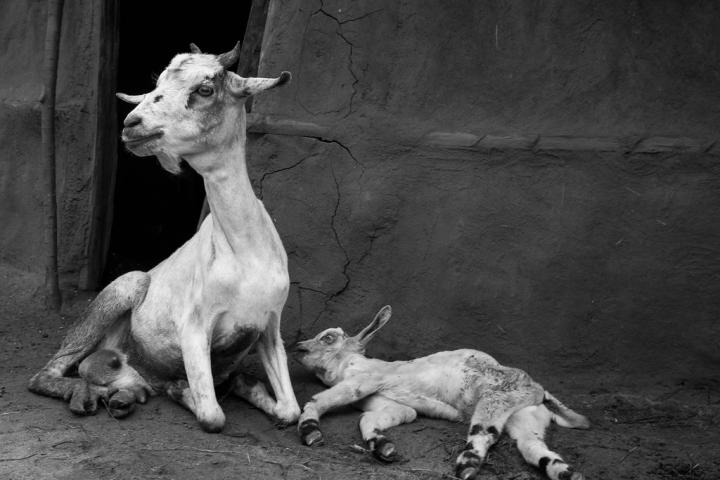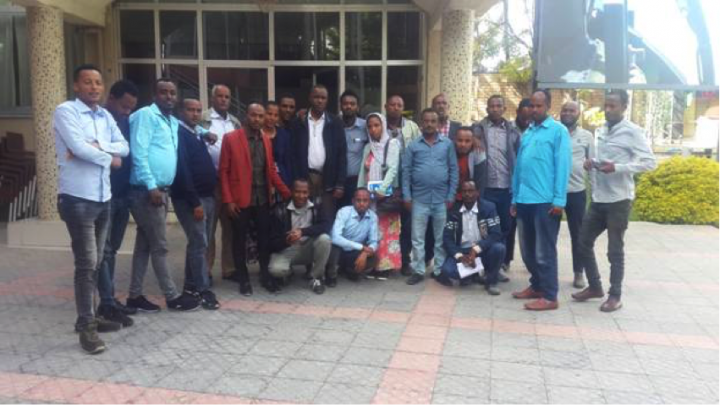An evidence-based approach for improving young livestock health in Ethiopia
A research consortium led by the Ethiopian Ministry of Agriculture is evaluating husbandry and health interventions that may improve young livestock health, and thus inform a large-scale strategy for reducing young stock mortality.
By Vanessa Meadu, SEBI

Illness and death of young livestock in Ethiopia has long been accepted as commonplace, part of the daily ups and downs of rural life. Although Ethiopia’s livestock population is the largest on the African continent, productivity has been relatively low. The death of young livestock is part of this problem; mortality estimates range from 36-49% in different farm animal systems. This is holding back Ethiopia’s agriculture sector, where livestock is a major source of nutrition and income. Now, a consortium led by the Ethiopian Ministry of Agriculture is evaluating husbandry and health interventions that may improve young livestock health, and thus inform a large-scale strategy for reducing young stock mortality.
“Ethiopia’s Livestock Master Plan has identified animal mortality as a major constraint of livestock development,” said Dr Kassaw Amssalu from the Ministry of Agriculture. He explained that this needs to be addressed during the country’s current five-year plan, known as the Growth and Transformation Program.
Responding to this need, the members of the Young Stock Mortality Consortium (YSM), including Addis Ababa University (AAU), Gondar University, University of California Davis (UC Davis), Tufts University, the National Animal Health Diagnostic and Investigation Center (NAHDIC), and Supporting Evidence Based Interventions (SEBI) at the University of Edinburgh, are working together to generate new epidemiological evidence on the major causes of young stock morbidity and mortality, and to pilot health interventions as potential solutions. The initiative aims to reduce mortality in Ethiopia’s young cattle, small ruminants, and camels, building on previous work done by the Feed the Future program.
In order to better understand the causes and risk factors of young stock mortality, scientists from UC Davis, Aklilu Lemma Institute of Pathobiology (ALIPB) of AAU and Gondar University have been collecting samples for disease testing with particular focus on diarrhoea and respiratory disorders. Consortium members have developed packages of animal health and farm management interventions, to tackle young stock mortality.
Before the packages can be implemented at a national scale, they first need to be tested to identify strengths and opportunities for improvement. Accordingly, the YSM consortium intervention packages are being piloted in six districts of Ethiopia, covering 900 households in peri-urban, mixed crop-livestock, and pastoral production systems. These intervention packages range from basic farm hygiene and improved feeding systems, to better neonatal care with a focus on adequate colostrum feeding, vaccination against prevalent endemic diseases, deworming for common parasites, and clinical care for morbid individuals.

SEBI has been contributing to the project by
- Providing assistance in benchmarking of livestock health status
- Facilitating and leading the development of the monitoring and evaluation plan for the consortium
- Supporting the College of Veterinary Medicine of AAU to pilot the intervention packages in two districts.
Rigorous Monitoring & Evaluation is essential
Rigorous monitoring and evaluation (M&E) is key to understanding whether a project is proceeding according to plan, whether the intervention has been successful, and what impact was achieved. Since 2017, SEBI has been providing ongoing M&E support to the YSM Consortium participants. This has included training consortium members on developing a results framework, selecting indicators, developing an M&E plan and designing baseline and final evaluation questionnaires for each of the six districts. SEBI also provided technical support for data management, including developing software for data entry, and creation of a database for the consortium.
“A strong framework for monitoring and evaluation is critical when implementing a field project” said Meritxell Donadeu, SEBI lead consultant on the YSM project. “This way, we can closely monitor implementation and be ready to implement solutions when challenges arise. At the end of project, we can understand what was expected, what was achieved, and any unforseen consequences of these interventions,” she explained.
Learning from implementation

SEBI is directly supporting a research team from Addis Ababa University, led by Prof Alemayehu Lemma, to pilot the intervention packages with farmers. The team will work in two districts: Siyadeber which predominantly has mixed crop-livestock systems, and Fafen which is largely pastoral. A total of 300 livestock keepers across the two districts will be trained on the management, husbandry, and disease control intervention packages and causes of any mortality will be subject to laboratory investigation. The field work began in March 2019, starting with a baseline evaluation questionnaire. SEBI consultant Veronica Nwankpa is working closely with the AAU team in Ethiopia to process the data collected from the questionnaires, and initial results of the pilot study showing impact on young stock mortality are expected in early 2020.
“This project is crucial for testing these interventions,” said Prof Lemma. “This work will also help us identify major causes of young stock mortality in Ethiopia across the various domestic livestock production systems,” he said. “The goal is to produce better evidence for the government to make decisions and investments. But the ultimate beneficiary will be livestock owners,” he explained.
More information:
Project information: Addressing young stock mortality in smallholder farms and pastoral herds of Ethiopia
Research Report: Fentie T. et. al. (2016). Assessment of the magnitude and causes of young stock mortality in major production systems of Ethiopia

